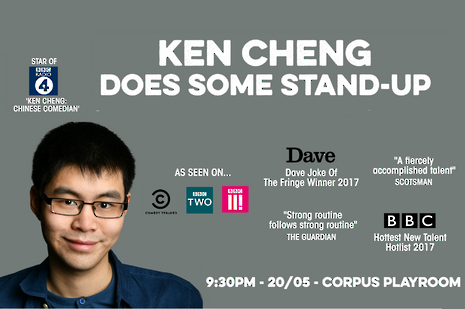Ken Cheng Does Some Stand-up: What We Learned
Ken Cheng gives insight into his writing process and tells about the racism he has encountered

Last night, Ken Cheng gave us an insight into how he puts together his stand-up shows. The ex-Footlight and star of E4’s The Hangover Games is currently preparing material for his original Edinburgh Fringe show, 'To All the Racists I've Blocked Before" and brought some to test at the Corpus Playroom for one night only. He explained that the show's content is still taking shape, the script half-written, and so there was an exciting sense that we were invited into his writing process.
This added an interesting meta-layer to the evening’s humour: Cheng would explain drily that an anecdote had "narrative significance later on", or quip that "that part was dark, but it's thematically relevant." This authenticity made refreshing sense, given that Cheng's material focused so much on his personal experience of being a comic.
Cheng's story is an eclectic one: he grew up in a “rough part of Cambridge” (“which sounds like an oxymoron, but it’s not”), studied Maths at St John’s College, Cambridge, but then dropped out to become a professional poker player. Following the success of his YouTube and Twitter comedy (including his much-publicised Twitter thread criticising every world flag), he U-turned into TV comedy and live stand-up, which saw him win Joke of the Fringe in 2017. As he makes clear, Cheng’s experience of being an ethnic minority is inextricable from this trajectory.
There was an exciting sense that we were invited into his writing process
"This show is all about racism," he quips, "so you'd better get on board now." We realise that this is because, in many ways, Ken's life has been defined by it too. He talks about pinch points in his school and comedy careers, when he realised that "this is how it's gonna be": the kinds of job he'd be offered, how other kids treated him, and even his Twitter mentions, were because his parents were born in China. He explains that, just as the way his comedy is received and the gigs he gets seem to pivot on his ethnicity, so he wants his stand-up to focus unashamedly on what that's like.
He jokes that his material relies on the racism he experiences in the lead-up to a show. "Imagine if they solved racism today," He says. "Just my luck, when I've already booked the Fringe venue and paid the deposit."
Ken's trajectory has also taken him to unlikely venues (he mentions Maidenhead and Tiverton: Tory strongholds where his jokes about minority experience aren't always well-received) and introduced him to sources of racism which, as he explains, he feels increasingly unable to ignore. He wants to speak truth to power, to pick apart racism, and to prove that British-Chinese writers can write about the British-Chinese experience. Perhaps this last one should be self-evident, but that's not what Ken's been told. He emphasises that he’s still figuring out how to do these things: making us privy to his journey of thinking it through.
As part of this, Cheng is unhesitatingly open about personal experiences (the show feels very honest, like reading his journal), and talks us through his childhood to his latest career move. Along the way, he offers anecdotes about encounters with brash locals, analyses the nuances of racism, and responds flippantly to Twitter abuse. In especially raw moments Ken talks about difficult career decisions: he is candid about the question of trading principles for jobs, and “at what point you sell out.” He also doesn't claim to have the solution to this, but reflects on times he feels he's "rolled over too fast.” As Ken closes his set with a very recent example, where he risked his job to stand up for Chinese writers, we are aware that, like the process of putting his show together, he’s taking us with him on this journey in real-time.
 News / Cambridge academics sign open letter criticising research funding changes22 February 2026
News / Cambridge academics sign open letter criticising research funding changes22 February 2026 News / Supporters protest potential vet school closure22 February 2026
News / Supporters protest potential vet school closure22 February 2026 News / Student and union protesters hold ‘Trans Liberation Solidarity Rally’ 24 February 2026
News / Student and union protesters hold ‘Trans Liberation Solidarity Rally’ 24 February 2026 News / Union speakers condemn ‘hateful’ Katie Hopkins speech14 February 2026
News / Union speakers condemn ‘hateful’ Katie Hopkins speech14 February 2026 News / Union cancels event with Sri Lankan politician after Tamil societies express ‘profound outrage’20 February 2026
News / Union cancels event with Sri Lankan politician after Tamil societies express ‘profound outrage’20 February 2026










